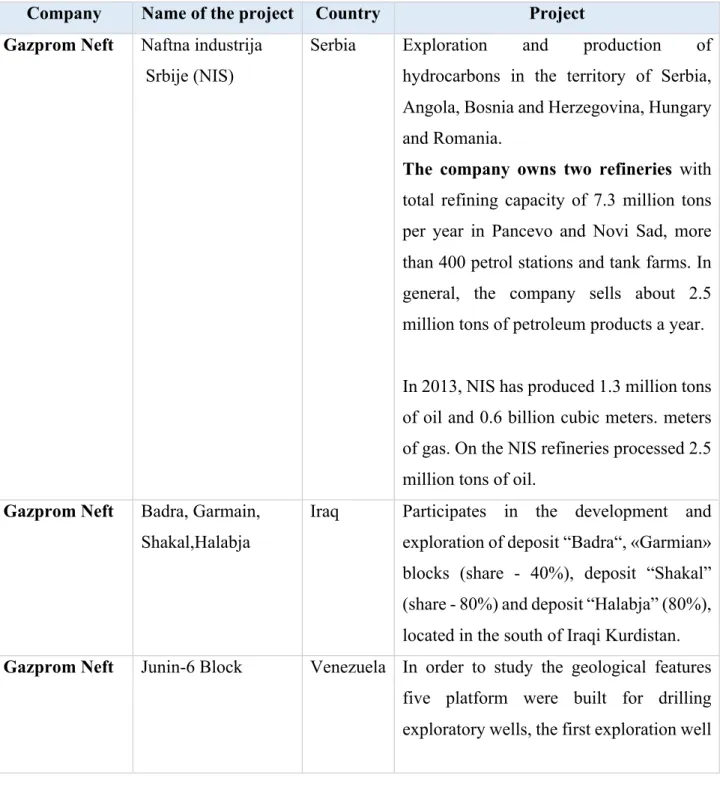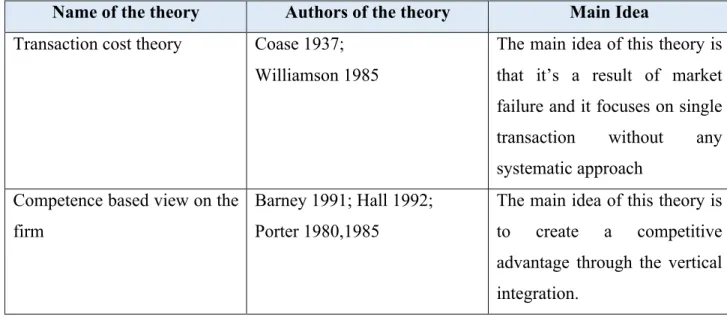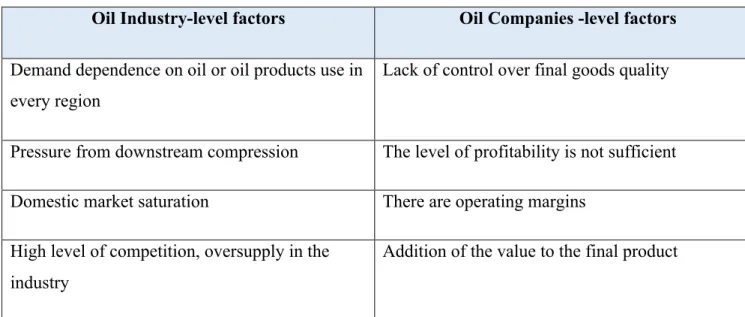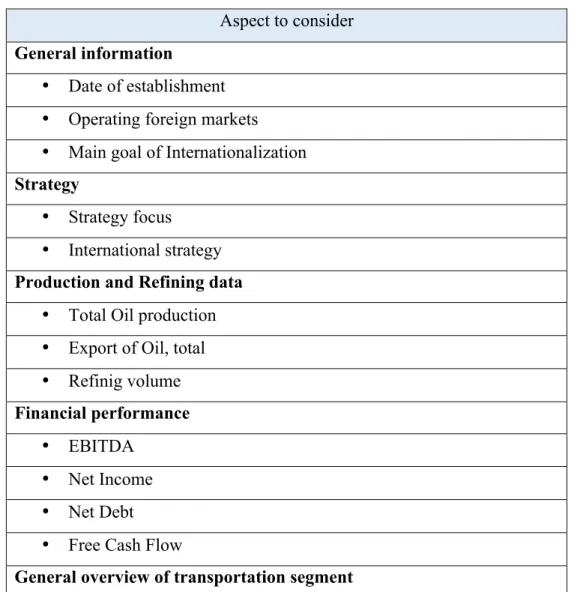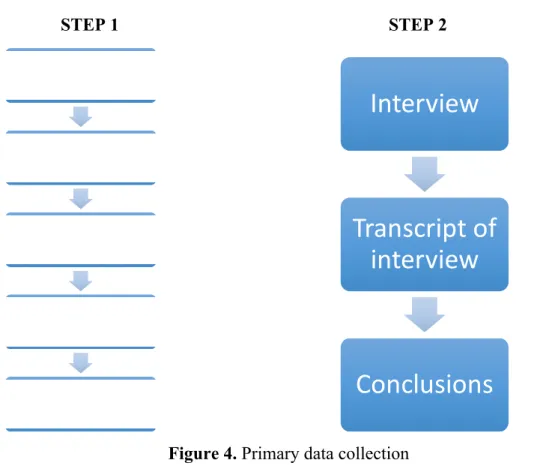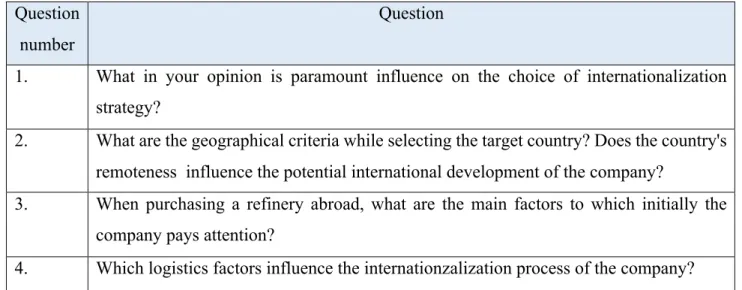The research results revealed that logistics and supply chain factors influence the choice of internationalization and vertical integration strategy of Russian oil companies. The present paper provides little insight into the rationale and factors influencing the process of internationalization and vertical integration of oil companies. The purpose of the study is to identify the main logistics and supply chain factors that influence the choice of potential market for internationalization and vertical integration.
The first chapter is devoted to the literature review of the concept of the internationalization process of oil companies, focusing on the trend of Russian oil companies and the main features. The second chapter analyzes information about the phenomenon of vertical integration of Russian oil companies.
INTERNATIONALIZATION OF OIL COMPANIES
Theoretical approach to Internationalization
- Resource-based view theory on the Internationalization process of oil companies
- Internationalization trends of Russian Oil companies
The OLI paradigm is one of the most important frameworks for analyzing the determinants of the internationalization process and international activities of multinational enterprises. Russia is an emerging market and oil exports are one of the most important economic activities. The company is supposed to take into account its specific resources and the demand of the market it wants to enter.
Lukoil owns several refineries in Ukraine, Bulgaria, Romania and a 49% stake in the ISAB refining complex (Sicily island, Italy) and a 45% stake in the TRN refinery in the Netherlands. Lukoil's marketing campaign is large and is presented in more than 26 countries: Azerbaijan, Belarus, Belgium, Bulgaria, Croatia, Cyprus, Czech Republic, Estonia, Finland, Georgia, Hungary, Italy, Latvia, Lithuania, Luxembourg, Macedonia, Moldova, Montenegro, Poland, Romania, Serbia,. In this chapter we have analyzed the main internationalization strategies of oil companies and we have come to the conclusion that the main goal of internationalization is to gain access to a new market and specific resources.

VERTICAL INTEGRATION OF OIL COMPANIES
- Vertical Integration and Value Chain in Oil industry
- Downstream sector: logistical aspect in transportation of Oil and Oil products
- Factors affecting the choice of vertical integration strategy
- Research gap
Global Value approach is one of the most modernized theoretical approaches related to the vertical integration. From the perspective of the petroleum industry, vertical integration has many advantages, it prolongs the process of seeking value creation and diversifies the sources of income. The vast majority of the companies in the industry use vertical integration strategy, they have international assets, but the use of the strategy and its processes differ from company to company.
The oil is moved at a speed of 3 m/sec under the influence of the pressure difference created by pumping stations. The rates depend on the direction of transport, quantity of delivery, distance to destination and some other factors. Transport via the sea terminal in the Baltic countries and the CIS countries has decreased.
The main objective of the analysis of oil industry-level factors and oil company-level factors is to determine that oil industry-level factors influence oil company-level factors and influence decisions to vertically integrate or not. In the oil industry, vertical integration is expected to save costs in: storage, refinery planning and most transactions. These factors greatly influence the decision of the internationalization process, the choice of country.
Iyer points out that despite the extensive literature on internationalization and supply chain performance in the petroleum industry, much less is known about the logistical factors that influence country choice for internationalization. From the perspective of the oil industry, vertical integration is spreading risks and bringing profits to every stage of the chain between the wellhead and the petrol station. It is also necessary to mention that vertical integration is one of the most expensive strategies to coordinate.

METHODOLOGY
- Description of methodological research process. Methods of study
- Case selection
- Data Collection
- Time horizons
- Evaluation criteria and validity
- Limitations of study
The purpose of this particular research is to fill a gap in existing theory on internationalization and vertical integration theories of Russian oil companies, specifically, which supply chain factors and logistics factors influence the decision-making process of choosing internationalization and vertical integration strategies. Depending on the purpose of the research, research can be descriptive research that shows profiles, events or situations, exploratory research that is the study of a new phenomenon to understand what is happening, and finally explanatory research that focuses on cause and effect. analysis (Saunders, 2007). The main advantage of this type of research is that it is flexible and adaptable to changes without losing the direction of the research (Matthews & Ross, 2010).
The main danger and weakness of the interview method is that it requires your communication skills to be at a high level. How critical are the differences in the transportation system between countries when choosing a destination country. As a result of the interview, we have a transcript, a description of the companies' international activities and some additional documents.
In general, these notes were made by the author according to primary data collected from industry representatives and secondary data were obtained through the analysis of documents such as: annual reports of companies, description of the market, databases. Regarding the time horizon of the research, this analysis is considered a cross-sectional analysis. In addition, this research is trying to build a theory based on the data that is present in the particular moment of writing and literature.
The interviewees were further asked to review a draft of the case study report, to establish a chain of evidence. The researcher will be an active part of the research and be influenced by the data collected. Therefore, researcher bias and influences are inevitable, and the results of the findings and conclusions cannot be replicated identically.
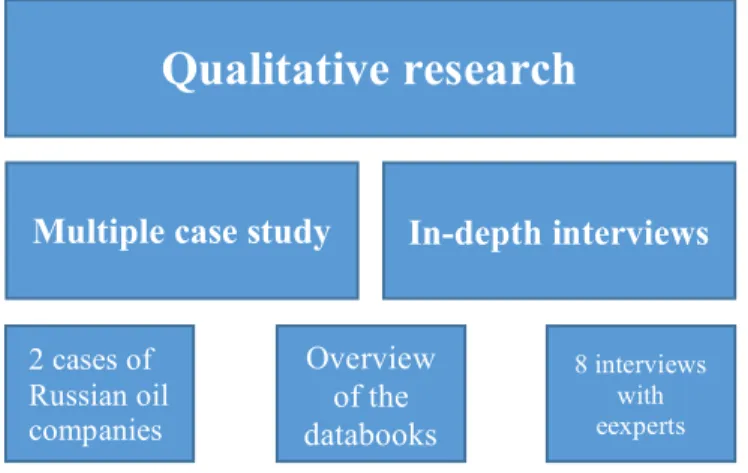
CASE STUDY
- Case of Gazprom Neft
- Case of Lukoil
- Interview analysis
- Application of logistical and supply chain factors in case analysis of Gazprom Neft
- Application of logistical and supply chain factors in case analysis of Lukoil
34;Gazpromneft-Transport" - a subsidiary, part of the structure of the company "Gazprom Neft", provides services for the distribution of oil products by road. Lukoil is one of the largest oil companies in Russia and according to the Global Energy Company the ranking is 13th in the world.The company's top managers own about 27% of the shares and it is important to mention that the Russian government has very reserved influence on the company.
Development of the transportation segment helps the company improve logistics management and control transportation costs. LITASCO's expansion into new markets in Central America, China and the Middle East has helped make Lukoil one of the leading oil companies in the world. Political issues are considered by management to be one of the most important factors influencing the decisions of oil companies.
Another factor mentioned by experts is the safety of industrial processes and environmental protection. Experts mentioned it as one of the very important factors, because in today's competitive market on an international scale, it is necessary to monitor the supplier's shipments, to provide the supplier with information from the requirements. The company pays attention to the aspects of the refinery: In the investment of the attractiveness of the project for synergy, the growth of the regional market, of the country market, guaranteeing the security of investments, the tax regime and maintaining its privileges and preferences". .
Experts called this one of the very important factors, because in today's competitive market on an international scale it is necessary to have a fast and reliable transportation system. All managers indicated that logistics and supply chain are one of the most crucial aspects that influence the decision-making process of internationalization and vertical integration of Russian oil companies. The project was successful because Gazprom had the opportunity to sell products directly in Serbia, without transportation costs.
Control over the supply chain Acquisition of 49% of the joint venture of ERG SpA and ISAB. The project was successful because Lukoil had the opportunity to sell the product directly in Italy, without transport costs.

CONCLUSIONS AND IMPLICATIONS
- Conclusions
- Theoretical contribution
- Managerial Implications
- Recommendation for future research and limitations
The thesis contributes to the sphere of Russian oil companies and the process of their internationalization and vertical integration and identifies the logistics and supply chain factors that are taken into account when choosing a strategy of internationalization and vertical integration. Theory of internationalization and vertical integration is being developed and there are many scientific papers devoted to these topics, but little research has been done on the logistics and supply chain factors that influence the decision-making process on whether to choose one or another strategy of vertical integration. and internationalization. As a theoretical implication, we can list the following, first, we identified the supply chain and logistics factors that influence the decision-making process while choosing a strategy for internationalization and vertical integration.
In addition, the traditional general perspectives of internationalization theories discussed in connection with the vertical integration of Russian oil companies to identify the list of factors influencing the choice of internationalization and vertical integration strategies, and out of these factors we have listed the most important ones from a theoretical and practical point of view. The list of identified factors has shown that, theoretically, similar factors influence the choice of strategies for internationalization and vertical integration. It was concluded that 4 supply chain and logistic factors determine the choice of strategy for internationalization and vertical integration.
In order to choose the right strategy of internationalization and vertical integration for the Russian oil companies, it is necessary to analyze all the factors that could influence its successful performance in the international market. The potential of logistics and supply chain improves the organizational and economic sustainability of the company in the market. Therefore, it is crucial to pay attention to logistics factors when planning internationalization and vertical integration activities. The Academy of Management Review Vol. 2007) An examination of the relationship between country of origin (COE) and the internationalization-performance paradigm. Management International Review, Vol.
The Internationalization Process of the Firm-A Model of Knowledge Development and Increasing Foreign Market Commitments. 1984, "Testing Stigler's Interpretation of 'Division of Labor is Limited by the Extent of the Market'," Journal of Industrial Economics. 2002., "Empirical Studies of Vertical Integration: The Transaction Costs Orthodoxy," International Review of Economics and Business.

